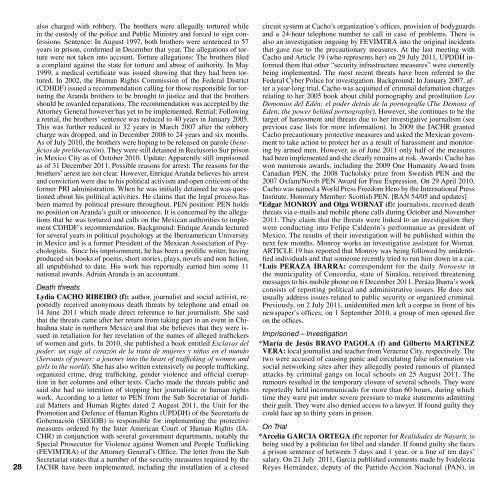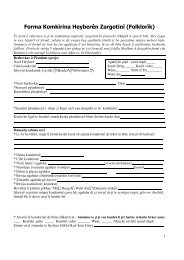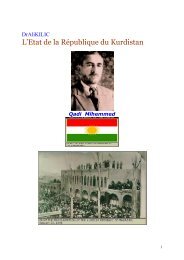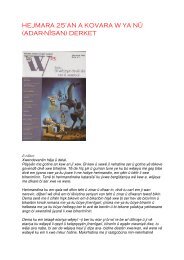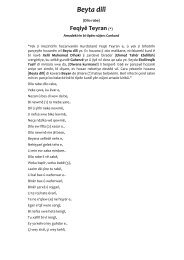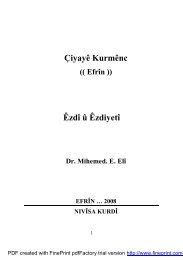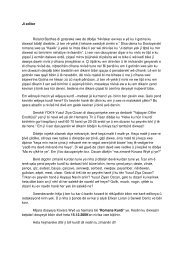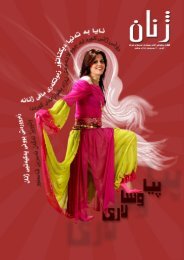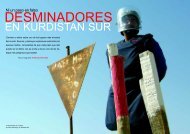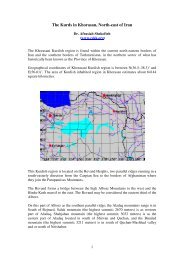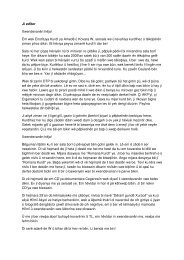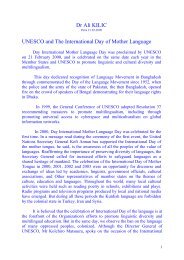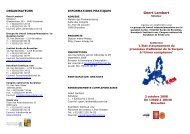Caselist - PEN International
Caselist - PEN International
Caselist - PEN International
Create successful ePaper yourself
Turn your PDF publications into a flip-book with our unique Google optimized e-Paper software.
28also charged with robbery. The brothers were allegedly tortured whilein the custody of the police and Public Ministry and forced to sign confessions.Sentence: In August 1997, both brothers were sentenced to 57years in prison, confirmed in December that year. The allegations of torturewere not taken into account. Torture allegations: The brothers fileda complaint against the state for torture and abuse of authority. In May1999, a medical certificate was issued showing that they had been tortured.In 2002, the Human Rights Commission of the Federal District(CDHDF) issued a recommendation calling for those responsible for torturingthe Aranda brothers to be brought to justice and that the brothersshould be awarded reparations. The recommendation was accepted by theAttorney General however has yet to be implemented. Retrial: Followinga retrial, the brothers’ sentence was reduced to 40 years in January 2005.This was further reduced to 32 years in March 2007 after the robberycharge was dropped, and in December 2008 to 24 years and six months.As of July 2010, the brothers were hoping to be released on parole (beneficiosde preliberación). They were still detained in Reclusorio Sur prisonin Mexico City as of October 2010. Update: Apparently still imprisonedas of 31 December 2011. Possible reasons for arrest: The reasons for thebrothers’ arrest are not clear. However, Enrique Aranda believes his arrestand conviction were due to his political activism and open criticism of theformer PRI administration. When he was initially detained he was questionedabout his political activities. He claims that the legal process hasbeen marred by political pressure throughout. <strong>PEN</strong> position: <strong>PEN</strong> holdsno position on Aranda’s guilt or innocence. It is concerned by the allegationsthat he was tortured and calls on the Mexican authorities to implementCDHDF’s recommendation. Background: Enrique Aranda lecturedfor several years in political psychology at the Iberoamerican Universityin Mexico and is a former President of the Mexican Association of Psychologists.Since his imprisonment, he has been a prolific writer, havingproduced six books of poems, short stories, plays, novels and non fiction,all unpublished to date. His work has reportedly earned him some 11national awards. Adrián Aranda is an accountant.Death threatsLydia CACHO RIBEIRO (f): author, journalist and social activist, reportedlyreceived anonymous death threats by telephone and email on14 June 2011 which made direct reference to her journalism. She saidthat the threats came after her return from taking part in an event in Chihuahuastate in northern Mexico and that she believes that they were issuedin retaliation for her revelation of the names of alleged traffickersof women and girls. In 2010, she published a book entitled Esclavas delpoder: un viaje al corazón de la trata de mujeres y niñas en el mundo(Servants of power: a journey into the heart of trafficking of women andgirls in the world). She has also written extensively on people trafficking,organized crime, drug trafficking, gender violence and official corruptionin her columns and other texts. Cacho made the threats public andsaid she had no intention of stopping her journalistic or human rightswork. According to a letter to <strong>PEN</strong> from the Sub Secretariat of JuridicalMatters and Human Rights dated 2 August 2011, the Unit for thePromotion and Defence of Human Rights (UPDDH) of the Secretaría deGobernación (SEGOB) is responsible for implementing the protectivemeasures ordered by the Inter American Court of Human Rights (IA-CHR) in conjunction with several government departments, notably theSpecial Prosecutor for Violence against Women and People Trafficking(FEVIMTRA) of the Attorney General’s Office. The letter from the SubSecretariat states that a number of the security measures required by theIACHR have been implemented, including the installation of a closedcircuit system at Cacho’s organization’s offices, provision of bodyguardsand a 24-hour telephone number to call in case of problems. There isalso an investigation ongoing by FEVIMTRA into the original incidentsthat gave rise to the precautionary measures. At the last meeting withCacho and Article 19 (who represents her) on 29 July 2011, UPDDH informedthem that other “security infrastructure measures” were currentlybeing implemented. The most recent threats have been referred to theFederal Cyber Police for investigation. Background: In January 2007, aftera year-long trial, Cacho was acquitted of criminal defamation chargesrelating to her 2005 book about child pornography and prostitution LosDemonios del Edén: el poder detrás de la pornografía (The Demons ofEden: the power behind pornography). However, she continues to be thetarget of harassment and threats due to her investigative journalism (seeprevious case lists for more information). In 2009 the IACHR grantedCacho precautionary protective measures and asked the Mexican governmentto take action to protect her as a result of harassment and monitoringby armed men. However, as of June 2011 only half of the measureshad been implemented and she clearly remains at risk. Awards: Cacho haswon numerous awards, including the 2009 One Humanity Award fromCanadian <strong>PEN</strong>, the 2008 Tucholsky prize from Swedish <strong>PEN</strong> and the2007 Oxfam/Novib <strong>PEN</strong> Award for Free Expression. On 29 April 2010,Cacho was named a World Press Freedom Hero by the <strong>International</strong> PressInstitute. Honorary Member: Scottish <strong>PEN</strong>. [RAN 54/05 and updates]*Edgar MONROY and Olga WORNAT (f): journalists, received deaththreats via e-mails and mobile phone calls during October and November2011. They claim that the threats were linked to an investigation theywere conducting into Felipe Calderón’s performance as president ofMexico. The results of their investigation will be published within thenext few months. Monroy works an investigative assistant for Wornat.ARTICLE 19 has reported that Monroy was being followed by unidentifiedindividuals and that someone recently tried to run him down in a car.*Luis PERAZA IBARRA: correspondent for the daily Noroeste inthe municipality of Concordia, state of Sinaloa, received threateningmessages to his mobile phone on 6 December 2011. Peraza Ibarra’s workconsists of reporting political and administrative issues. He does notusually address issues related to public security or organized criminal.Previously, on 2 July 2011, unidentified men left a corpse in front of hisnewspaper’s offices; on 1 September 2010, a group of men opened fireon the offices.Imprisoned – Investigation*María de Jesús BRAVO PAGOLA (f) and Gilberto MARTINEZVERA: local journalist and teacher from Veracruz City, respectively. Thetwo were accused of causing panic and circulating false information viasocial networking sites after they allegedly posted rumours of plannedattacks by criminal gangs on local schools on 25 August 2011. Therumours resulted in the temporary closure of several schools. They werereportedly held incommunicado for more than 60 hours, during whichtime they were put under severe pressure to make statements admittingtheir guilt. They were also denied access to a lawyer. If found guilty theycould face up to thirty years in prison.On Trial*Arcelia GARCIA ORTEGA (f): reporter for Realidades de Nayarit, isbeing sued by a politician for libel and slander. If found guilty she facesa prison sentence of between 3 days and 1 year, or a fine of ten days’salary. On 21 July 2011, Garcia published comments made by IvideleziaReyes Hernández, deputy of the Partido Acción Nacional (PAN), inwhich Reyes accused Omar Reynoso Gallegos, deputy of a rival party(Partido Revolucionario Institucional (PRI)), of financial embezzlementduring his time as state secretary for health. Garcia has written to variousgovernment authorities and journalistic organisations denouncing her‘intimidation’ by the politician, claiming that in the state of Nayarit, legalcharges of libel and defamation are regularly used to censor journalists.She also points out that the comments which she published were alsopublished by other news sources, and yet she and a colleague are theonly ones who face charges. Principle 10 of the IACHR’s Declaration ofPrinciples of Free of Expression says that ‘the protection of reputation ofa government worker or public person must be protected only using civilsanctions.’ It also says that it must be proved that the journalist/communicatorpublished information with the intention of causing harm, of thatthey did so knowing that it was untrue.NICARAGUADeath threat*Silvia GONZALEZ (f): reporter for the daily El Nuevo Diario in thenorthern city of Jinotega, received death threats in September 2011 andhas had to flee the country. The repeated threats referred to her work.González wrote a series of articles beginning in February about the formerguerrilla member Gabriel José Garmendia, widely known as “Yajob,”who was killed in February under mysterious circumstances. She alsowrote about corruption in the local government. Soon after the publicationof the articles, González reportedly began receiving anonymousphone calls in which she was reportedly told, “If you keep bothering us,we give you 48 hours to live.” She also received text messages warningher to stop writing or unspecified people would “give it to her where ithurts most,” news reports said. At the end of July, a local party memberknown as “El Pajarito” (The Little Bird) approached González’ 24-yearolddaughter and told her that her mother would be hurt if she continuedwriting. González filed a complaint with the local police, who arrested ElPajarito on August 4 but then released him for lack of evidence after hedenied the charges. González publicized the threats against her with thehelp of local human rights groups, accusing the police of neglecting hercase. In late August, González found a chicken head along with a notewith her name on it outside of her home.PERUOn trialMelissa Rocío PATIÑO HINOSTROZA (f): poet and university student,is a member of the ‘Círculo del sur’ (Southern Circle) poetry groupin Lima and runs a poetry programme on radio and cultural activities withyoung people. Patiño (21) is on trial for terrorism, based on her allegedinvolvement with a leftwing political organization, Bolivarian ContinentalCoordinator (Coordinadora Continental Boliviariana – CCB), which thePeruvian authorities claim is linked to terrorist groups. She denies anypolitical affiliations and to date no concrete evidence has been producedto back up the charges. Patiño was detained from 29 February to 8 May2008, when she was released pending trial. She potentially faces 20 yearsin prison if convicted. Arrest and detention: Patiño was arrested along withsix others in Tumbes, on the border with Ecuador, on 29 February 2008.The seven were returning by bus from Quito, where they had attended thesecond congress of the CCB from 24 to 28 February 2008, which was reportedlyheld with the knowledge and consent of the Ecuadorian authorities.They were subsequently charged with ‘Affiliation and Collaborationwith Terrorism’, apparently on the basis of their attendance at the CCBmeeting. Initially detained in Tumbes and the Counterterrorism Division(División Contra el Terrorismo – DINCOTE), on 15 March 2008 Patiñowas transferred to Santa Monica maximum security prison in Chorrillos,Lima, where she was held until 8 May 2008. Background: The governmentalleges that the Peruvian chapter of CCB has links with PeruvianMarxist rebel group Movimiento Revolucionario Túpac Amaru (MRTA)and the FARC guerrilla group in Colombia. It also reportedly accusedCCB members of planning to sabotage the 2008 Asia-Pacific EconomicCooperation (APEC) meetings in Peru. Two of the six individuals whowere detained along with Patiño are said to be former MRTA members;one has served a prison sentence for belonging to the MRTA and since hisrelease has reportedly been organizing workshops and events at the universitywhere Patiño studies (Universidad Mayor de San Marcos, Lima).However, Patiño’s presence in the bus carrying former MRTA membersappears to have been circumstantial. She denies that she belongs to or hasever had any involvement in any political groups. She reportedly attendedthe CCB congress after a colleague at the radio station where she workspassed the invitation on to her as he could not himself attend, and her mainmotivation for attending was the opportunity to travel to Ecuador. Charges:According to Patiño’s lawyer, the accusations of terrorism against Patiñohave been made on the basis of her alleged membership of the Peruvianchapter of the CCB, her attendance of the CCB congress in Ecuador andher participation in a march at the end of conference. During the march,she is said to have partially covered her face and shouted anti-imperialistand pro-socialism slogans, and to have been linked to graffiti criticizingAlan García, the Peruvian president, according to a 13 March 2008 documentissued by the Public Prosecutor. None of these activities can be saidto amount to terrorist activities. Conditional release: On 8 May 2008, afteralmost two and a half months’ incarceration, Patiño was released on bailof 1,000 Soles (approx. $240) and allowed to return home. Her releaseis conditional and she remains on trial. Peru’s antiterrorist prosecutor,Julio Galindo, appealed against the decision to release Patiño, but thiswas rejected on 12 September 2008, meaning that Patiño will remain freeon bail for the duration of her trial. Legal process: According to Patiño’slawyer, in December 2009 her file was forwarded to the chief Prosecutor(Fiscal Superior) who would decide whether or not to go ahead with theprosecution. In early May 2010, it was confirmed that the Prosecutor haddecided not to pursue the case. As of July, Patiño’s lawyer was waiting fora final decision from the Criminal Court (Sala Penal) and thought that itwas “highly likely” that the case would be dropped. New information: Asof January 2011, Patiño’s case was pending before the Supreme Court ofJustice, where it had been unexpectedly referred by the Criminal Court inorder to validate the latter’s decision not to proceed. According to Patiño’slawyer, this turn of events is due to the fact that although Patiño is notbeing prosecuted, another person arrested at the same time as her, RoqueGonzalez, is due to go on trial. Patiño’s lawyer says the delay in Patiño’scase is entirely irregular and she has requested that the Criminal Court’sdecision be implemented as soon as possible. No further news as of 31December 2011. [RAN 20/08 and updates].*Uri Ben SCHMUEL: editor of the newspaper La Razon, was, in July2011, facing a lawsuit filed by the National Elections Council (JuradoNacional de Elecciones, JNC). It was claimed that he had failed to includeall the technical information associated with a survey printed inthe paper. The JNC had controversially amended the requirements for thedissemination of survey result in December 2010. No further informationat 31 December 2011. 29


